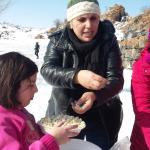Distant-Online Science and Country Studies
Primary tabs
Author:
Taking into account some unpredictable situations (generally flu epidemics, children’s diseases like chickenpox, mumps and so on) the procedure of regular lessons at schools may be disrupted. Let’s take the case of this year: acute upper respiratory tract infection or the so called “Swine Flu”. As we are carrying out author alternative pedagogy we found a quick and flexible solution.
The three weeks of “Isolation” in January turned into weeks of distant teaching. It is true that there have been a lot of individual cases of distant teaching and learning arising out of certain circumstances individual learners encountered, but to pass on interschool ubiquitous distant-online educational process was, of course, a novelty.
I conducted distant online lessons in primary school subjects: Science and Country Studies. I opened a category of distant-online teaching in my blog. I want to mention that organizational part was more laborious than in case of ordinary lessons. I had to make up tasks to be fulfilled at home with possible participation of family members and to carry out online control over the learners’ work.
During the first week I suggested that the learners themselves should form questions and send to each other. I think that the first week had some organizational shortcomings (I didn’t use the electronic register, and the learners’ involvement rate was low). Things got much better during the second week. I used the trick “Question out of question”. The learners were supposed to form their own questions while seeking for the answers to my questions. Then they were to send their own questions to each other and try to answer them. Then they were supposed to publish these questions and answers in the “comments” section of the corresponding distant-online lesson. The “Question out of question” trick was very interesting: there were interesting discussions, and the learners were given a chance to take part in organizing a distant lesson-online lesson with the help of their own questions and answers.
I chose several interesting questionnaires and appointted the learners, those who had formed the questionnaire, in charge for the distant-online lesson. For example, Ani Arghutyan Grade 5, Yakovlev Artem Grade 4. Then we had interesting discussions.
The fulfillment of such tasks expanded, and we decided that we should organize one “Question out of a question” lesson once a week so that each learner would have a chance to conduct such kind of a lesson. This way of organizing lessons fosters learners’ responsibility and interest in the contents of the course.
Another way of having a distant teaching-learning is the organization of educational Flash Mobs when the learners’ family members also take part in it. There was an online discussion on Goharik Arghutyan’s question which had a nature protection content we are all concerned about: why don’t they close down nuclear power stations if there are alternative ways of getting electricity? We will develop this issue and take part in Eco Tour 2016 with it.
Distant education also had its difficulties. The work is consistent and under pressure otherwise we wouldn't have any results. It is difficult to explain some science terms, phenomena or concepts online. But it also had its interests and excitements. We found the answer to any question with our joint efforts. During those three weeks we prepared for the February Science Review.
It was also interesting for me to take part in this distant-online way of organizing lessons. My daughter Maria and I took part in interesting pre-school projects. Here are the results: Good Morning, Maria is Studying Science.

